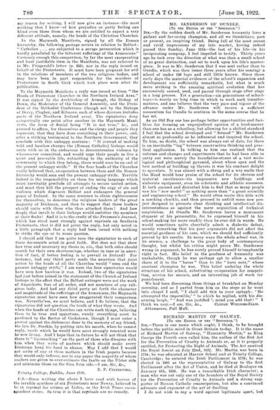MR. SANDERSON OF. OUNDLE.
[To THE EDITOR or THE " SPECTATOR:] Stn,—By the sudden death of Mr. Sanderson humanity loses a gallant and far-seeing champion, and all we Oundelians, past or present, an inspiring friend. Being full of the most recent and vivid impressions of my late master, having indeed passed this Sunday, June 11th—the last of his life—in his invigorating company, I feel impelled to testify. Thirty years ago he took over the direction of what was then a small school of no great distinction, and set to work upon his life's master- piece. It was to Mr. Sanderson that I was sent rather than to Oundle, which was then (some three years after his coming) a school of under 150 boys and still little known. Since those early days the material evidences of the school's expansion and development are sufficiently remarkable, but what is much more striking is the amazing spiritual evolution that has successively caused, used, and passed through stage after stage in a long process. Yet a generation—six generations of school- boys—is surely no long time in which to work such transfor- mations, and one believes that the very pace and vigour of the advance under Mr. Sanderson will insure a sufficient momentum for Oundle to continue in the same course that he has set.
As an Old Boy one has perhaps better opportunities and faci- lities for forming an unprejudiced opinion of a head-master than one has as, a schoolboy, but allowing for a shifted standard I feel that the school developed and " formed " Mr. Sanderson almost as profoundly as he influenced and inspired the school. To him, no doubt, the school was always out of date, for there is an inevitable "lag" between constructive thinking and prac- tical application. In talking to him one realized that the reforms and changes and experiments that he had been able to carry out were merely the foundation-stones of a vast soeio- logical and philosophical pyramid, about whose apex and the best method of building up thereto it was his constant delight to speculate. It was almost with a shrug and a wry smile that the Head would hear praise of the school for its obvious and material excellences—its impressive new buildings and elaborate equipment, even its scholastic and athletic successes. It both amused and disturbed him to find that so many people saw his " new model" as nothing more than " a great scientific and engineering school." He would often recite this title with a mocking chuckle, and then proceed to unfold some new pro- ject designed to promote clear thinking and intellectual dis- interestedness as against the mere acquisition of technical empiricism. At Oundle Mr. Sanderson leaves a monument eloquent of his personality, for he expressed himself in his school-making far more readily than he ever did in words. He would sometimes quite cheerfully admit a dialectic defeat, merely remarking that his poor arguments did not affect the essential goodness of his case, which we should find sufficiently proved by his results. In many ways the whole school was, in its essence, a challenge to the great body of contemporary thought, but whilst his critics might prove Mr. Sanderson wrong in argument, he has surely proved himself triumphantly right in fact. His belief in the goodness of humanity was unshakable, though he was perhaps apt to allow a smaller share of it to the "haves " than to the " have nots," whose constant champion he was. This belief underlay the whole structure of his school, substituting co-operation for competi- tion, service for success, and an interesting job of work for punishment.
We had been discussing these things at breakfast on Monday morning, and as I parted from him on the steps as he went into chapel I said, "I shall add this to your epitaph : He attempted the impossible,' " to which he replied, with his dis- arming laugh, " ' And was justified '; mind you add that! " I
think we may.—I am, Sir, &c., CLOUGH WILLIAMS-ELLIS.
Athenaeum, Pall Mall.


































 Previous page
Previous page